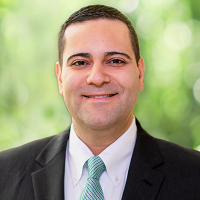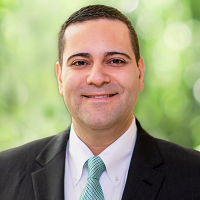Investing for Charitable Giving: Discipline Reaps Rewards
Consider doing nothing when markets get volatile, rather than shifting your charitable investing strategy in the moment.


Profit and prosper with the best of Kiplinger's advice on investing, taxes, retirement, personal finance and much more. Delivered daily. Enter your email in the box and click Sign Me Up.
You are now subscribed
Your newsletter sign-up was successful
Want to add more newsletters?

Delivered daily
Kiplinger Today
Profit and prosper with the best of Kiplinger's advice on investing, taxes, retirement, personal finance and much more delivered daily. Smart money moves start here.

Sent five days a week
Kiplinger A Step Ahead
Get practical help to make better financial decisions in your everyday life, from spending to savings on top deals.

Delivered daily
Kiplinger Closing Bell
Get today's biggest financial and investing headlines delivered to your inbox every day the U.S. stock market is open.

Sent twice a week
Kiplinger Adviser Intel
Financial pros across the country share best practices and fresh tactics to preserve and grow your wealth.

Delivered weekly
Kiplinger Tax Tips
Trim your federal and state tax bills with practical tax-planning and tax-cutting strategies.

Sent twice a week
Kiplinger Retirement Tips
Your twice-a-week guide to planning and enjoying a financially secure and richly rewarding retirement

Sent bimonthly.
Kiplinger Adviser Angle
Insights for advisers, wealth managers and other financial professionals.

Sent twice a week
Kiplinger Investing Weekly
Your twice-a-week roundup of promising stocks, funds, companies and industries you should consider, ones you should avoid, and why.

Sent weekly for six weeks
Kiplinger Invest for Retirement
Your step-by-step six-part series on how to invest for retirement, from devising a successful strategy to exactly which investments to choose.
There are plenty of fears that rob investors of sleep — perhaps none more so than market volatility. Whether investing for retirement or another long-term goal, few investors look forward to unpredictable swings in the market — and the same is true when investing for charitable giving goals. The reality is periods of market volatility are part of the investing landscape. And they’re rarely the right time to make drastic adjustments to your portfolio or your investment approach.
With the right partners and the right strategy in place, the best approach during periods of market volatility is to stay disciplined and take a long-term view. It’s an important virtue worth further exploring to help investors confidently navigate market volatility and offer a bit of peace of mind. Here are a few key takeaways for investors to consider when faced with market volatility and the impact it can have on charitable investments.
The right approach for when market volatility looms
When markets are fluctuating and the news is reporting selloffs and course corrections, staying disciplined with your charitable investment strategy is easier said than done. Doing nothing is often the hardest thing to do. Yet the research is clear: Attempts to time the market are futile. The best and worst trading days often happen in close proximity. Attempting to dodge losses often means missing opportunities for gains.
From just $107.88 $24.99 for Kiplinger Personal Finance
Become a smarter, better informed investor. Subscribe from just $107.88 $24.99, plus get up to 4 Special Issues

Sign up for Kiplinger’s Free Newsletters
Profit and prosper with the best of expert advice on investing, taxes, retirement, personal finance and more - straight to your e-mail.
Profit and prosper with the best of expert advice - straight to your e-mail.
Let’s take the COVID-19 pandemic and related market downturn as an example. Based on Vanguard calculations using data from Morningstar, Inc.1, if an investor had exited the market in March 2020 through the recovery in July 2020, they would have seen a negative 2% return. On the other hand, those who maintained a conventional portfolio balance of 60% stocks and 40% bonds would have seen a 21% return over that period of market volatility. Even amid a historic pandemic, drastic action was the wrong approach.
When it comes to disciplined investing, the right long-term charitable investment plan — coupled with the right charitable investment partner — is paramount. Without a sound investment strategy, it will be difficult to achieve your investment goals during any market conditions, but particularly during periods of volatility. The best investment plans are built to withstand market volatility in accordance with an investor’s goals and risk tolerance and, in the case of charitable investment plans, a donor’s charitable timeframe. That indicates that the time for donors to think about how they’ll handle market volatility is when they are building their portfolio and investment strategy, not during times of major market swings. The right partner will help investors navigate this.
Different investment approaches will yield different perspectives on market volatility and discipline. Vanguard Charitable, for instance, adheres to Vanguard’s time-tested investment principles, emphasizing diversification, low costs and a long-term outlook. Finding a partner that can deliver options based on sound principles, aligned with individual investor preferences, is vital to successfully navigating market volatility in the long term. Investors cannot control market movements, but they can keep more of their returns by reducing investment costs and taxes.
Planning for the unexpected
Too often, just the suggestion of looming market volatility tempts investors to take sweeping actions related to their portfolios. Geopolitical events, interest rate changes, shifting regulations, natural disasters and other headline-grabbing events all have the potential to impact markets and short-term performance. It’s not always easy, but these are the times when investors need to stay disciplined and rely on their strategy and long-term perspective. It’s the most important time to trust that the difficult decisions have already been made and the right plan is in place.
With charitable investing, there are several actions that can help donors remain disciplined. Here are four steps:
- Make regular contributions to sustain growth and granting
- Stay invested through volatile times, unless a reallocation was a part of original plans
- Rebalance to manage risks and maintain a suitable asset allocation
- Have a plan for charitable giving
Market upswings, on the other hand, could mean opportunities to enhance charitable giving while achieving the tax benefits that come by giving with a donor-advised fund (DAF), a giving vehicle that supports immediate needs and long-term causes through grants to qualified 501(c)(3) charities. These market tailwinds could prompt investors to increase expected or unexpected giving and further their philanthropic impact.
Staying the course results in greater charitable impact
Many investors saving for retirement fear volatility or a dip in the market, especially as they near their final days of gainful employment and a steady paycheck. For those investing for charitable purposes, this timing concern is less pronounced, but no less important to consider and manage properly. When investing and giving with a DAF, the money in the account is already earmarked for philanthropic purposes and will continue to grow tax-free. This gives donors greater flexibility to execute their giving strategy.
DAFs empower urgent giving as well. When natural disasters or other unexpected giving needs occur, donors should remain disciplined and rely on their investment strategy to navigate need and the potential impact of giving. In some cases, the same causes or events creating unpredictable markets will come with a call for charitable giving that donors can support.
The concept of disciplined investing, while not a new one, is a proven approach for investors of all kinds. Keeping a long-term view and accepting the ebbs and flows of the market historically result in greater gains over time. Even better, the right charitable investment vehicle, strategy and partner can shield investors from the stress of market volatility and provide peace of mind that there is a plan in place to help them meet — and often exceed — their philanthropic goals now and into the future.
Related Content
- Six Ways to Optimize Your Charitable Giving Before Year-End
- How High Interest Rates Enhance a Type of Charitable Trust
- The Secret to Supercharging Your Charitable Giving: Low Fees
- Maximize Charitable Giving Tax Savings and Give All Year
- Benefits of Charitable Contributions You May Be Overlooking
Profit and prosper with the best of Kiplinger's advice on investing, taxes, retirement, personal finance and much more. Delivered daily. Enter your email in the box and click Sign Me Up.

Mark Froehlich joined Vanguard Charitable, a 501(c)(3) public charity sponsoring donor-advised funds, as chief financial officer in 2019. As a certified public accountant, he works to oversee the nonprofit’s finance and operations functions. An experienced financial leader, Mark has always maintained a strong connection to the nonprofit sphere. Most recently, he was the chief financial officer at the Philadelphia Foundation.
-
 Dow Adds 1,206 Points to Top 50,000: Stock Market Today
Dow Adds 1,206 Points to Top 50,000: Stock Market TodayThe S&P 500 and Nasdaq also had strong finishes to a volatile week, with beaten-down tech stocks outperforming.
-
 Ask the Tax Editor: Federal Income Tax Deductions
Ask the Tax Editor: Federal Income Tax DeductionsAsk the Editor In this week's Ask the Editor Q&A, Joy Taylor answers questions on federal income tax deductions
-
 States With No-Fault Car Insurance Laws (and How No-Fault Car Insurance Works)
States With No-Fault Car Insurance Laws (and How No-Fault Car Insurance Works)A breakdown of the confusing rules around no-fault car insurance in every state where it exists.
-
 Dow Adds 1,206 Points to Top 50,000: Stock Market Today
Dow Adds 1,206 Points to Top 50,000: Stock Market TodayThe S&P 500 and Nasdaq also had strong finishes to a volatile week, with beaten-down tech stocks outperforming.
-
 No-Fault Car Insurance States and What Drivers Need to Know
No-Fault Car Insurance States and What Drivers Need to KnowA breakdown of the confusing rules around no-fault car insurance in every state where it exists.
-
 7 Frugal Habits to Keep Even When You're Rich
7 Frugal Habits to Keep Even When You're RichSome frugal habits are worth it, no matter what tax bracket you're in.
-
 The Best Precious Metals ETFs to Buy in 2026
The Best Precious Metals ETFs to Buy in 2026Precious metals ETFs provide a hedge against monetary debasement and exposure to industrial-related tailwinds from emerging markets.
-
 For the 2% Club, the Guardrails Approach and the 4% Rule Do Not Work: Here's What Works Instead
For the 2% Club, the Guardrails Approach and the 4% Rule Do Not Work: Here's What Works InsteadFor retirees with a pension, traditional withdrawal rules could be too restrictive. You need a tailored income plan that is much more flexible and realistic.
-
 Retiring Next Year? Now Is the Time to Start Designing What Your Retirement Will Look Like
Retiring Next Year? Now Is the Time to Start Designing What Your Retirement Will Look LikeThis is when you should be shifting your focus from growing your portfolio to designing an income and tax strategy that aligns your resources with your purpose.
-
 I'm a Financial Planner: This Layered Approach for Your Retirement Money Can Help Lower Your Stress
I'm a Financial Planner: This Layered Approach for Your Retirement Money Can Help Lower Your StressTo be confident about retirement, consider building a safety net by dividing assets into distinct layers and establishing a regular review process. Here's how.
-
 Stocks Sink With Alphabet, Bitcoin: Stock Market Today
Stocks Sink With Alphabet, Bitcoin: Stock Market TodayA dismal round of jobs data did little to lift sentiment on Thursday.